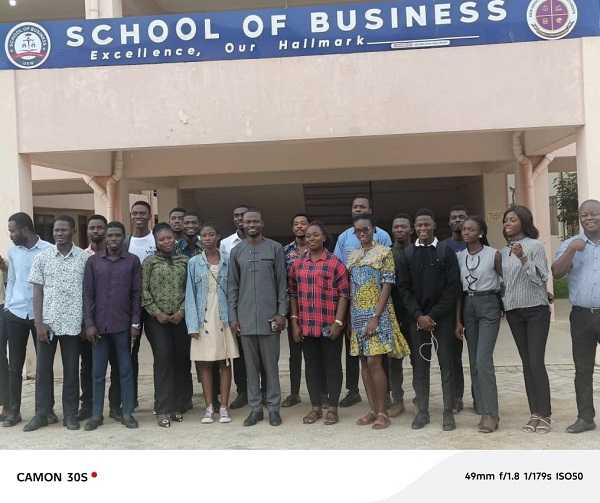The School of Business of the University of Education, Winneba (UEW), in collaboration with the British Council, Afriventure Lab and UGBS Innovation Hub, has launched a new initiative, the Think Graduates Entrepreneurship and Employability Training (ThinkGEES) Project, to equip students and graduates with practical skills in innovation, entrepreneurship, and job creation.
Speaking at the event in his welcome address, the Dean of the Department of Business, Professor Richard Oduro, urged students to take full advantage of the opportunity, describing it as a rare and transformative experience designed to prepare them for both employment and enterprise development.
“These opportunities are rare and must be seized, especially when they come free,” Prof Oduro said. “ThinkGEES is not only about preparing you for jobs but empowering you to create jobs and contribute meaningfully to Ghana’s economy.”
He commended the project partners, faculty members, and staff for their commitment to building a new generation of innovative thinkers and entrepreneurs.
Prof Oduro encouraged trainees to participate actively and approach the programme with optimism and purpose. “Together, we are nurturing a generation of thinkers and innovators who will shape the future and serve as agents of change,” he added.
The ThinkGEES Project, implemented in collaboration with the School of Business, the British Council, and other international partners, seeks to blend academic training with practical entrepreneurship support to enhance graduate employability and self-reliance.
The Vice Dean of the University of Education, Winneba (UEW) Business School, Prof Emmanuel Erastus Yamoah, emphasised the importance of effectual entrepreneurship and design thinking as essential tools for innovative business development.
Speaking as a facilitator at the ThinkGEES Training Programme, Prof Yamoah explained that aspiring and existing entrepreneurs can thrive in uncertain environments by applying the Five Principles of Effectual Entrepreneurship.
He outlined the principles as:
1. Bird-in-Hand – starting with available resources and leveraging what one already possesses to create opportunities.
2. Affordable Loss – determining acceptable levels of loss and acting within them to reduce risks.
3. Leveraging Contingencies – transforming unexpected events into opportunities while adapting to new circumstances.
4. Strategic Partnerships – forming collaborations and alliances to co-create and shape the future.
5. Pilot-in-the-Plane – focusing on controllable factors and taking deliberate actions to influence future outcomes.
Prof Yamoah explained that these principles empower entrepreneurs to move beyond traditional predictive planning and instead adopt a mindset of innovation through action and adaptability.
He noted that effectuation and design thinking are complementary approaches that encourage entrepreneurs to design solutions around real-world challenges, experiment creatively, and co-create value with stakeholders.
Dr Yaw Brew, who spoke mainly on Business Ideation and Design Thinking, indicated that an opportunity is a favourable set of circumstances that creates a need for a new product, service, or business.
Shedding more light on the concept of Design Thinking, he describes it as a vital framework for innovation and problem-solving in modern business and product development.
Dr Brew explained that Design Thinking is a systematic approach to developing an innovative product, service, business model, or strategy.
He emphasised that the process focuses on human-centred design, which involves incorporating relevant stakeholder needs into the goals of problem-solving to ensure practical and sustainable outcomes.
Dr Brew added that the approach uses research and insights to highlight the importance of identifying problems accurately and understanding customer needs as a foundation for innovation.
According to him, organisations and entrepreneurs that adopt design thinking are better positioned to create impactful solutions that resonate with users and drive growth.
The session formed part of ThinkGEES’ broader goal of equipping participants with practical entrepreneurial skills to transform ideas into sustainable ventures.
Among the facilitators were Prof Emmanuel Erastus Yamoah, Vice Dean of the School of Business, Dr Yaw Brew and Madam Elizabeth Yeboah Quarshie, who also took participants through CV writing and interview preparation and industry engagement.
In an interview with Dr Mawuko Dza, Coordinator of the UEW Innovation Hub and Vice President of the THINK Network Ghana, he mentioned that the training is to equip students, graduates and employees with entrepreneurial skills, retool them and closely monitor their progress to ensure accountability.
Dr Dza stressed that the British Council, Afriventure Lab and UGBS Innovation Hub are positioning students, through the training, to be job creators and national leaders in entrepreneurship in the real-world enterprises.

